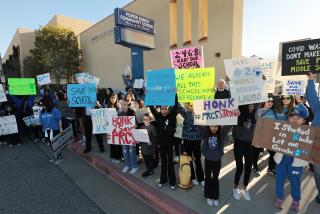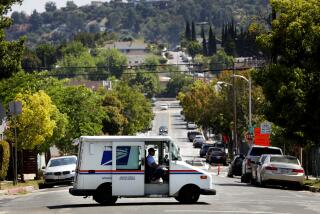Op-Ed: Inglewood’s class of 2019 is graduating with top honors in navigating adversity
Last week, I went to the Morningside High School graduation on the campus of Los Angeles Southwest College. Morningside is one of two high schools in the Inglewood Unified School District. My neighbor, Brianna, who moved in next door to me when she was about 10, was getting her diploma and that gave me a good reason to indulge my fondness for the rituals of graduation — the ceremony can be overdone and dull, yes, but it’s always thrilling to see another generation inhabit those caps and gowns that never change.
Morningside’s graduation, however, was dispiriting as well as inspiring. Brianna was one of roughly 200 seniors graduating from a public school built for classes of about 500. The setting, Southwest College’s football field, made the class of 2019, seated in a few rows of white folding chairs near one of the towering goalposts, seem even smaller.
I know Inglewood Unified has been in trouble for years, unraveled by aggressive charter school growth, middle-class flight and fiscal woes caused in part by students and their families seeking diplomas from schools with better reputations than Inglewood’s. But to see the decimation up close was sobering. And seeing the gentrification forces targeting Inglewood now, forces that many people fully expect will transform this city — into what, no one has said exactly — felt downright ominous. These black and Latino seniors may be the future, but it’s increasingly doubtful they’ll be the future of the city they call home.
These black and Latino seniors may be the future, but it’s increasingly doubtful they’ll be the future of the city they call home.
The school officials delivered boilerplate sentiments about the graduates moving on to the next phase of life, how hard they’d worked, how the sky was the limit. Then came the class salutatorian, Evan Hardin, a charismatic young black man whose own upbeat words resonated with a subtext that spoke to something quite different. We are successful, he suggested, because it is Morningside we are graduating from, period. We have beaten back naysayers and stereotypes that would make us, Morningside and Inglewood failures, less than. We have been formed — positively, in his estimation — by a school and a community that people have written off as dead, irrelevant, in need of a reboot or even replacement. In remaining upright and on a path of fulfillment and hope despite this, we have triumphed.
It was a familiar message to me but the context was wrong. It reminded me of funerals I’ve attended, where praise is accorded to someone who may not have enjoyed wild success but who definitely did not succumb to the inertia and self-loathing common to black lives in still, now, always segregated America. It’s a subtle way to assess success, but a legitimate one, and yet, on the football field last week, it was also troubling. Why couldn’t these students feel purely good about themselves and their school experience? Why did they have to qualify their achievements: We persevered, we succeeded at Morningside, despite Morningside.
Even as I indignantly posed the question, I knew the answer.
The day before the graduation I was at a conference at UCLA that discussed how technology, the official business of upward mobility, could help alleviate the achievement gap in public schools. The conference began with tech professionals, consultants and nonprofits touting programs and collaborative efforts aimed at getting “underserved” kids online and tech-savvy.
It was all good stuff, and it sounded like everybody was on the same page. And then the aura of polite togetherness was punctured when Kamau Bobb, who works on diversity strategy for Google and is the founder of the Constellations Center for Equity in Computing at Georgia Tech, delivered a smoldering keynote address that focused not so much on feel-good tech outreach programs but on the state of black folks in Atlanta, a majority-black city where black people are assumed to be thriving. They’re not.
Enter the Fray: First takes on the news of the minute »
With the black population shrinking in the face of gentrification and with dismal stats when it comes to black kids’ success in algebra by eighth grade (the gateway to a tech career), black fortunes are reversing. Tech could never on its own undo inequality that has been built by many different factors over decades, Bobb said. But in any case it hasn’t emerged as a particularly socially enlightened industry, despite its progressive, outlier image. In fact, right now it’s more notable for being part of the inequality status quo.
At Morningside’s graduation, Evan’s speech was an acknowledgement of the bigger color-coded problems that Bobb has studied and that Inglewood high school students grasp without trying. The prospect of dealing with these problems — and their corollary, struggle — is a given for these kids, and Evan chose to conclude his speech with the only possible solution. He quoted Nipsey Hussle, advice the murdered rapper once said he would have given to his younger self: “Be more fearless.”
Brianna, Evan and the rest of the Morningside High class of 2019 will certainly need innate courage to grow and truly succeed over their lifetimes. They will need the rest of us to be more fearless too — not just admiring and supportive neighbors like me, but all of us — in grappling with both the ominous change and the debilitating stagnation that threaten to leave them behind.
Erin Aubry Kaplan is a contributing writer to Opinion.
Follow the Opinion section on Twitter @latimesopinionand Facebook
More to Read
A cure for the common opinion
Get thought-provoking perspectives with our weekly newsletter.
You may occasionally receive promotional content from the Los Angeles Times.






